Swinburne University of Technology INF70005 Assignment 3 Report 2017
VerifiedAdded on 2020/03/16
|20
|5053
|44
Report
AI Summary
This report is a student's assignment from Swinburne University of Technology's INF70005 Strategic Project Management course, focusing on a project to develop a Virtual Reality (VR) Lab for children with Autism Spectrum Disorder. The report covers various aspects of project management, including team dynamics, risk management, project significance, aims, and objectives. It also delves into key challenges faced, such as unidentified process needs and unprofessional team members, and the strategies employed to mitigate these risks. The report highlights the importance of communication, collaboration, and talent management within the team. Furthermore, it discusses the application of knowledge management theory to address issues related to knowledge sharing in IT-related projects, providing insights into organizational, ecological, and techno-centric knowledge management approaches. The student reflects on learning outcomes, team dynamics, and the use of academic theory to deepen the understanding of project management concepts. The report also identifies project management issues and explores how academic theory can be used to gain insights into project management challenges. The report includes insights on how knowledge management can be improved and the best KM practices.
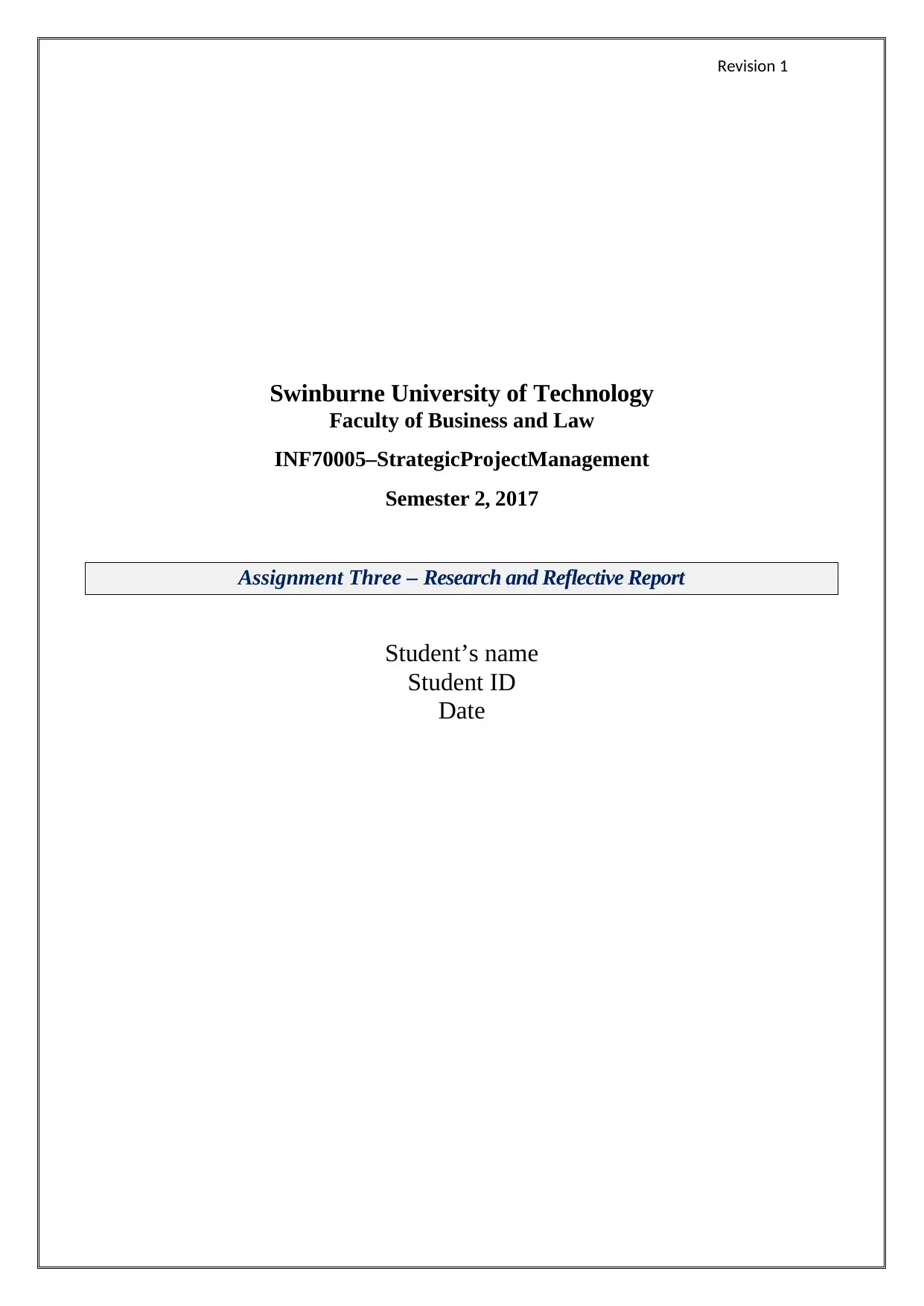
Revision 1
Swinburne University of Technology
Faculty of Business and Law
INF70005–StrategicProjectManagement
Semester 2, 2017
Assignment Three – Research and Reflective Report
Student’s name
Student ID
Date
Swinburne University of Technology
Faculty of Business and Law
INF70005–StrategicProjectManagement
Semester 2, 2017
Assignment Three – Research and Reflective Report
Student’s name
Student ID
Date
Paraphrase This Document
Need a fresh take? Get an instant paraphrase of this document with our AI Paraphraser
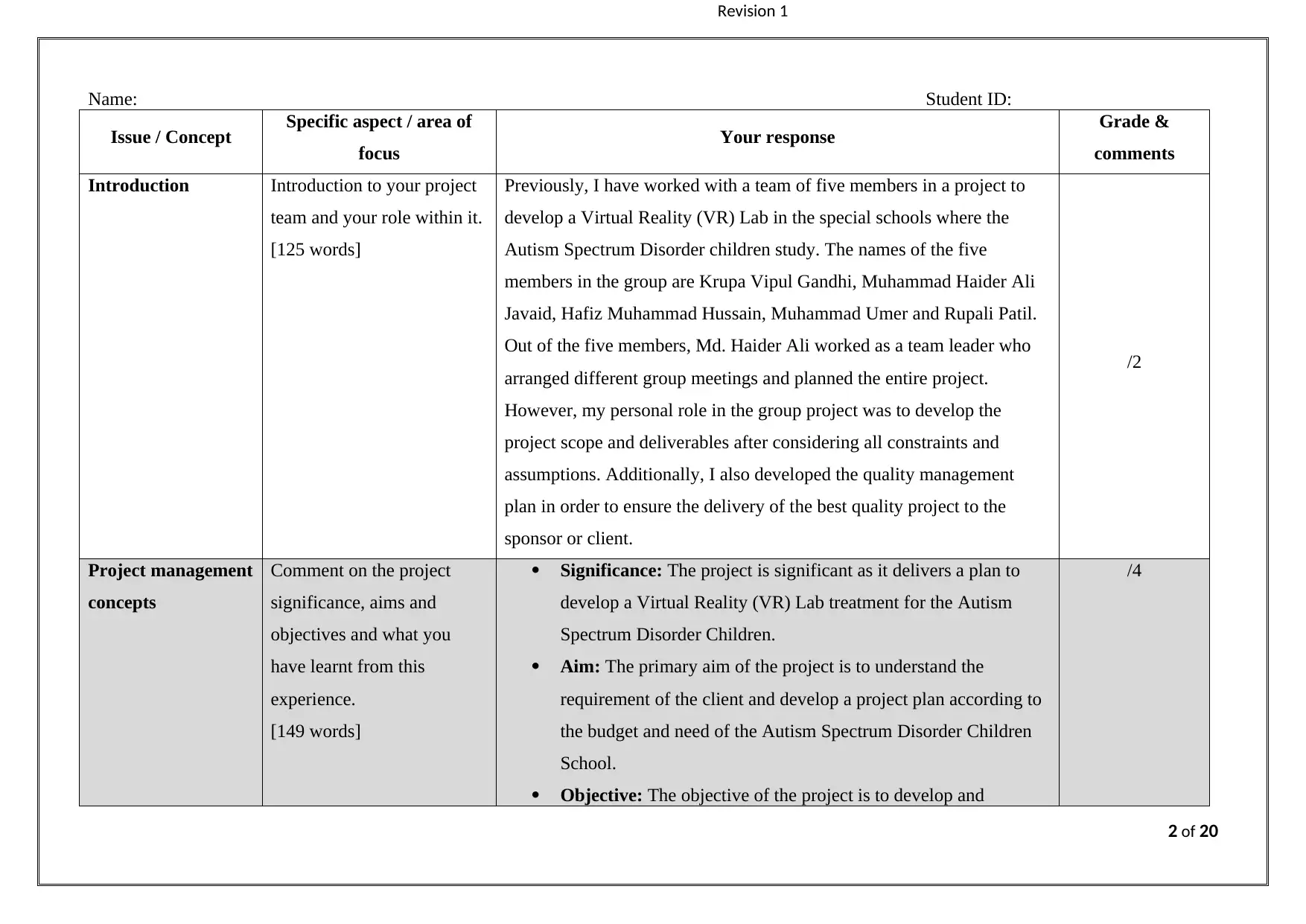
Revision 1
Name: Student ID:
Issue / Concept Specific aspect / area of
focus Your response Grade &
comments
Introduction Introduction to your project
team and your role within it.
[125 words]
Previously, I have worked with a team of five members in a project to
develop a Virtual Reality (VR) Lab in the special schools where the
Autism Spectrum Disorder children study. The names of the five
members in the group are Krupa Vipul Gandhi, Muhammad Haider Ali
Javaid, Hafiz Muhammad Hussain, Muhammad Umer and Rupali Patil.
Out of the five members, Md. Haider Ali worked as a team leader who
arranged different group meetings and planned the entire project.
However, my personal role in the group project was to develop the
project scope and deliverables after considering all constraints and
assumptions. Additionally, I also developed the quality management
plan in order to ensure the delivery of the best quality project to the
sponsor or client.
/2
Project management
concepts
Comment on the project
significance, aims and
objectives and what you
have learnt from this
experience.
[149 words]
Significance: The project is significant as it delivers a plan to
develop a Virtual Reality (VR) Lab treatment for the Autism
Spectrum Disorder Children.
Aim: The primary aim of the project is to understand the
requirement of the client and develop a project plan according to
the budget and need of the Autism Spectrum Disorder Children
School.
Objective: The objective of the project is to develop and
/4
2 of 20
Name: Student ID:
Issue / Concept Specific aspect / area of
focus Your response Grade &
comments
Introduction Introduction to your project
team and your role within it.
[125 words]
Previously, I have worked with a team of five members in a project to
develop a Virtual Reality (VR) Lab in the special schools where the
Autism Spectrum Disorder children study. The names of the five
members in the group are Krupa Vipul Gandhi, Muhammad Haider Ali
Javaid, Hafiz Muhammad Hussain, Muhammad Umer and Rupali Patil.
Out of the five members, Md. Haider Ali worked as a team leader who
arranged different group meetings and planned the entire project.
However, my personal role in the group project was to develop the
project scope and deliverables after considering all constraints and
assumptions. Additionally, I also developed the quality management
plan in order to ensure the delivery of the best quality project to the
sponsor or client.
/2
Project management
concepts
Comment on the project
significance, aims and
objectives and what you
have learnt from this
experience.
[149 words]
Significance: The project is significant as it delivers a plan to
develop a Virtual Reality (VR) Lab treatment for the Autism
Spectrum Disorder Children.
Aim: The primary aim of the project is to understand the
requirement of the client and develop a project plan according to
the budget and need of the Autism Spectrum Disorder Children
School.
Objective: The objective of the project is to develop and
/4
2 of 20
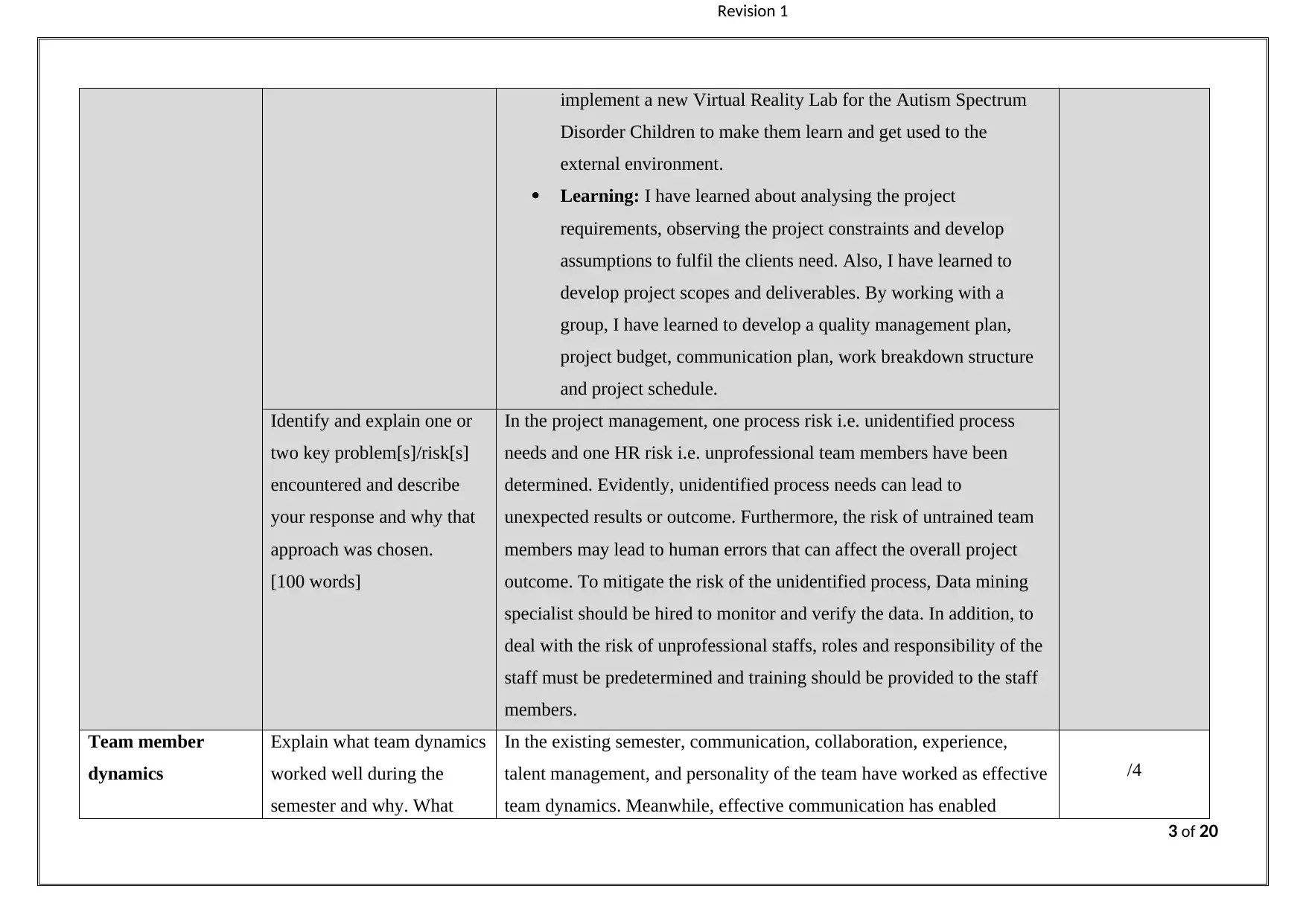
Revision 1
implement a new Virtual Reality Lab for the Autism Spectrum
Disorder Children to make them learn and get used to the
external environment.
Learning: I have learned about analysing the project
requirements, observing the project constraints and develop
assumptions to fulfil the clients need. Also, I have learned to
develop project scopes and deliverables. By working with a
group, I have learned to develop a quality management plan,
project budget, communication plan, work breakdown structure
and project schedule.
Identify and explain one or
two key problem[s]/risk[s]
encountered and describe
your response and why that
approach was chosen.
[100 words]
In the project management, one process risk i.e. unidentified process
needs and one HR risk i.e. unprofessional team members have been
determined. Evidently, unidentified process needs can lead to
unexpected results or outcome. Furthermore, the risk of untrained team
members may lead to human errors that can affect the overall project
outcome. To mitigate the risk of the unidentified process, Data mining
specialist should be hired to monitor and verify the data. In addition, to
deal with the risk of unprofessional staffs, roles and responsibility of the
staff must be predetermined and training should be provided to the staff
members.
Team member
dynamics
Explain what team dynamics
worked well during the
semester and why. What
In the existing semester, communication, collaboration, experience,
talent management, and personality of the team have worked as effective
team dynamics. Meanwhile, effective communication has enabled
/4
3 of 20
implement a new Virtual Reality Lab for the Autism Spectrum
Disorder Children to make them learn and get used to the
external environment.
Learning: I have learned about analysing the project
requirements, observing the project constraints and develop
assumptions to fulfil the clients need. Also, I have learned to
develop project scopes and deliverables. By working with a
group, I have learned to develop a quality management plan,
project budget, communication plan, work breakdown structure
and project schedule.
Identify and explain one or
two key problem[s]/risk[s]
encountered and describe
your response and why that
approach was chosen.
[100 words]
In the project management, one process risk i.e. unidentified process
needs and one HR risk i.e. unprofessional team members have been
determined. Evidently, unidentified process needs can lead to
unexpected results or outcome. Furthermore, the risk of untrained team
members may lead to human errors that can affect the overall project
outcome. To mitigate the risk of the unidentified process, Data mining
specialist should be hired to monitor and verify the data. In addition, to
deal with the risk of unprofessional staffs, roles and responsibility of the
staff must be predetermined and training should be provided to the staff
members.
Team member
dynamics
Explain what team dynamics
worked well during the
semester and why. What
In the existing semester, communication, collaboration, experience,
talent management, and personality of the team have worked as effective
team dynamics. Meanwhile, effective communication has enabled
/4
3 of 20
⊘ This is a preview!⊘
Do you want full access?
Subscribe today to unlock all pages.

Trusted by 1+ million students worldwide
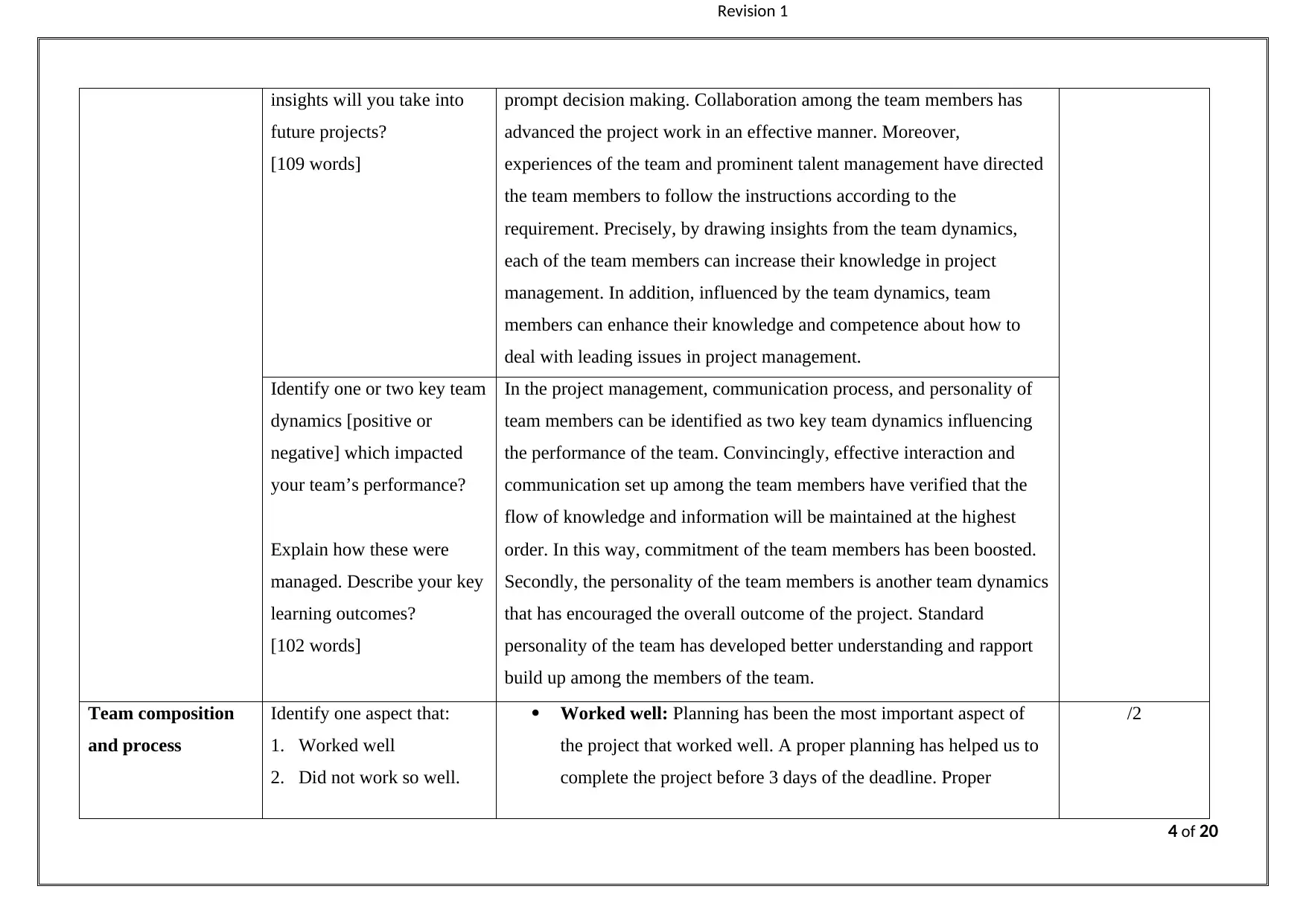
Revision 1
insights will you take into
future projects?
[109 words]
prompt decision making. Collaboration among the team members has
advanced the project work in an effective manner. Moreover,
experiences of the team and prominent talent management have directed
the team members to follow the instructions according to the
requirement. Precisely, by drawing insights from the team dynamics,
each of the team members can increase their knowledge in project
management. In addition, influenced by the team dynamics, team
members can enhance their knowledge and competence about how to
deal with leading issues in project management.
Identify one or two key team
dynamics [positive or
negative] which impacted
your team’s performance?
Explain how these were
managed. Describe your key
learning outcomes?
[102 words]
In the project management, communication process, and personality of
team members can be identified as two key team dynamics influencing
the performance of the team. Convincingly, effective interaction and
communication set up among the team members have verified that the
flow of knowledge and information will be maintained at the highest
order. In this way, commitment of the team members has been boosted.
Secondly, the personality of the team members is another team dynamics
that has encouraged the overall outcome of the project. Standard
personality of the team has developed better understanding and rapport
build up among the members of the team.
Team composition
and process
Identify one aspect that:
1. Worked well
2. Did not work so well.
Worked well: Planning has been the most important aspect of
the project that worked well. A proper planning has helped us to
complete the project before 3 days of the deadline. Proper
/2
4 of 20
insights will you take into
future projects?
[109 words]
prompt decision making. Collaboration among the team members has
advanced the project work in an effective manner. Moreover,
experiences of the team and prominent talent management have directed
the team members to follow the instructions according to the
requirement. Precisely, by drawing insights from the team dynamics,
each of the team members can increase their knowledge in project
management. In addition, influenced by the team dynamics, team
members can enhance their knowledge and competence about how to
deal with leading issues in project management.
Identify one or two key team
dynamics [positive or
negative] which impacted
your team’s performance?
Explain how these were
managed. Describe your key
learning outcomes?
[102 words]
In the project management, communication process, and personality of
team members can be identified as two key team dynamics influencing
the performance of the team. Convincingly, effective interaction and
communication set up among the team members have verified that the
flow of knowledge and information will be maintained at the highest
order. In this way, commitment of the team members has been boosted.
Secondly, the personality of the team members is another team dynamics
that has encouraged the overall outcome of the project. Standard
personality of the team has developed better understanding and rapport
build up among the members of the team.
Team composition
and process
Identify one aspect that:
1. Worked well
2. Did not work so well.
Worked well: Planning has been the most important aspect of
the project that worked well. A proper planning has helped us to
complete the project before 3 days of the deadline. Proper
/2
4 of 20
Paraphrase This Document
Need a fresh take? Get an instant paraphrase of this document with our AI Paraphraser
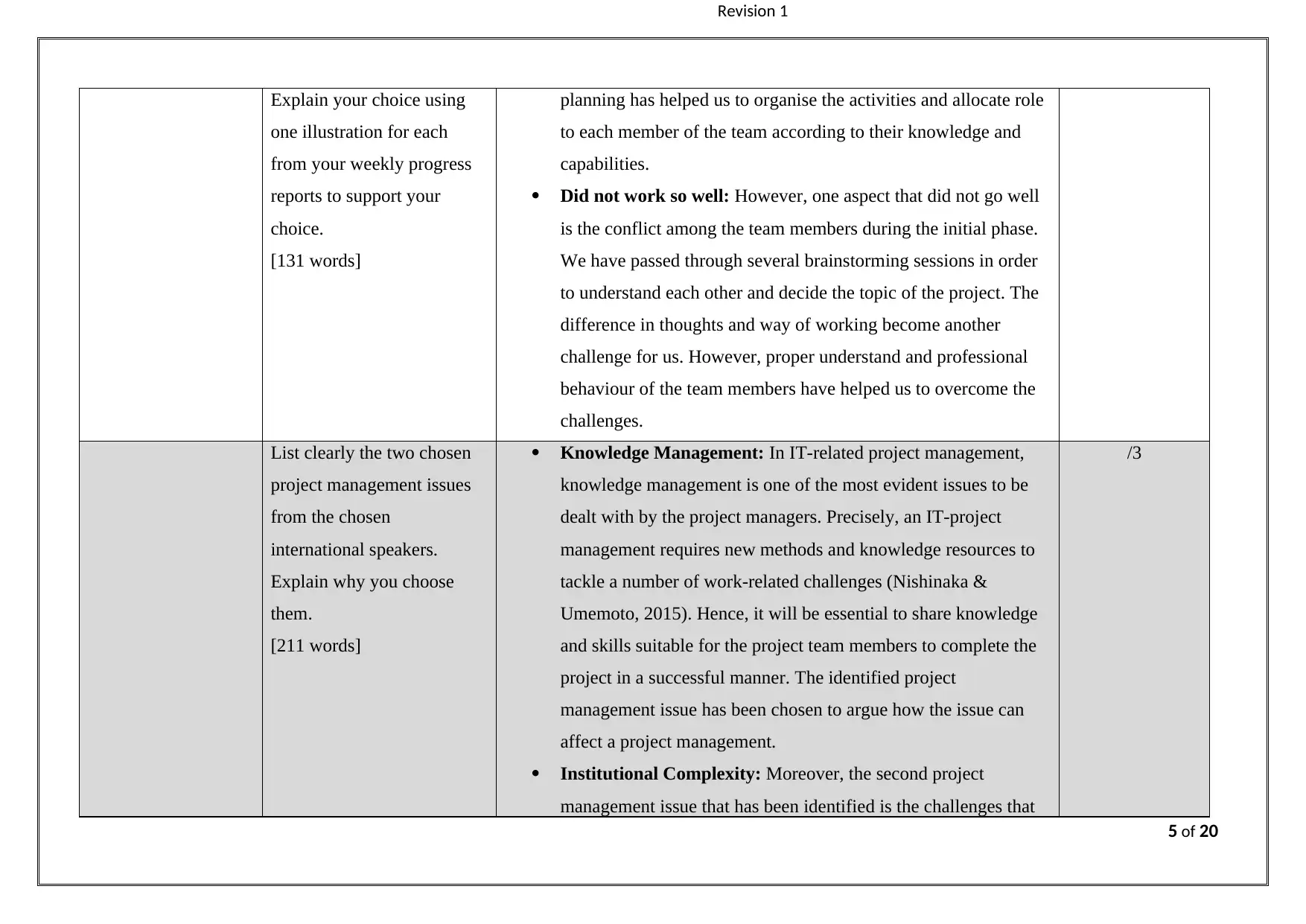
Revision 1
Explain your choice using
one illustration for each
from your weekly progress
reports to support your
choice.
[131 words]
planning has helped us to organise the activities and allocate role
to each member of the team according to their knowledge and
capabilities.
Did not work so well: However, one aspect that did not go well
is the conflict among the team members during the initial phase.
We have passed through several brainstorming sessions in order
to understand each other and decide the topic of the project. The
difference in thoughts and way of working become another
challenge for us. However, proper understand and professional
behaviour of the team members have helped us to overcome the
challenges.
List clearly the two chosen
project management issues
from the chosen
international speakers.
Explain why you choose
them.
[211 words]
Knowledge Management: In IT-related project management,
knowledge management is one of the most evident issues to be
dealt with by the project managers. Precisely, an IT-project
management requires new methods and knowledge resources to
tackle a number of work-related challenges (Nishinaka &
Umemoto, 2015). Hence, it will be essential to share knowledge
and skills suitable for the project team members to complete the
project in a successful manner. The identified project
management issue has been chosen to argue how the issue can
affect a project management.
Institutional Complexity: Moreover, the second project
management issue that has been identified is the challenges that
/3
5 of 20
Explain your choice using
one illustration for each
from your weekly progress
reports to support your
choice.
[131 words]
planning has helped us to organise the activities and allocate role
to each member of the team according to their knowledge and
capabilities.
Did not work so well: However, one aspect that did not go well
is the conflict among the team members during the initial phase.
We have passed through several brainstorming sessions in order
to understand each other and decide the topic of the project. The
difference in thoughts and way of working become another
challenge for us. However, proper understand and professional
behaviour of the team members have helped us to overcome the
challenges.
List clearly the two chosen
project management issues
from the chosen
international speakers.
Explain why you choose
them.
[211 words]
Knowledge Management: In IT-related project management,
knowledge management is one of the most evident issues to be
dealt with by the project managers. Precisely, an IT-project
management requires new methods and knowledge resources to
tackle a number of work-related challenges (Nishinaka &
Umemoto, 2015). Hence, it will be essential to share knowledge
and skills suitable for the project team members to complete the
project in a successful manner. The identified project
management issue has been chosen to argue how the issue can
affect a project management.
Institutional Complexity: Moreover, the second project
management issue that has been identified is the challenges that
/3
5 of 20
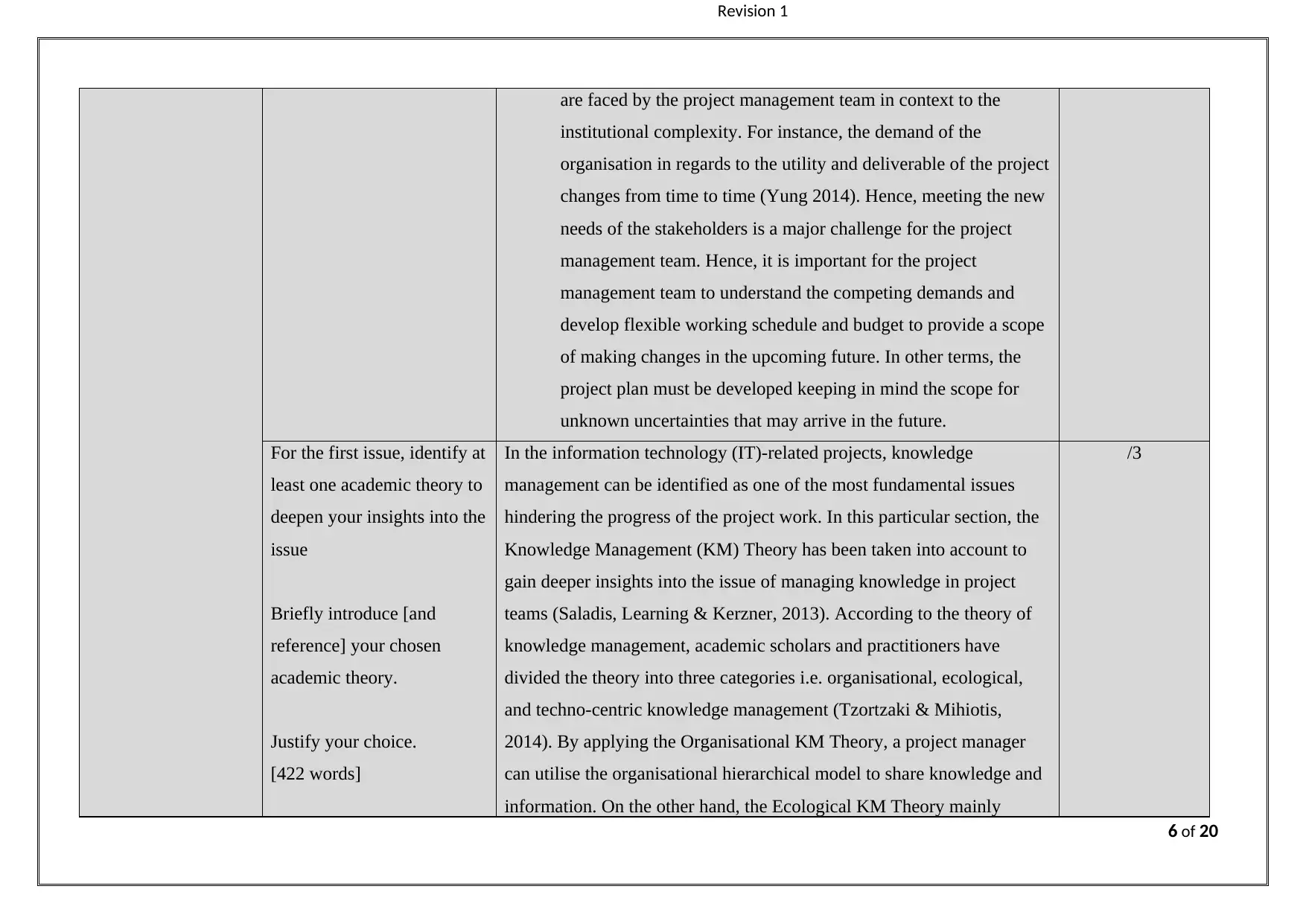
Revision 1
are faced by the project management team in context to the
institutional complexity. For instance, the demand of the
organisation in regards to the utility and deliverable of the project
changes from time to time (Yung 2014). Hence, meeting the new
needs of the stakeholders is a major challenge for the project
management team. Hence, it is important for the project
management team to understand the competing demands and
develop flexible working schedule and budget to provide a scope
of making changes in the upcoming future. In other terms, the
project plan must be developed keeping in mind the scope for
unknown uncertainties that may arrive in the future.
For the first issue, identify at
least one academic theory to
deepen your insights into the
issue
Briefly introduce [and
reference] your chosen
academic theory.
Justify your choice.
[422 words]
In the information technology (IT)-related projects, knowledge
management can be identified as one of the most fundamental issues
hindering the progress of the project work. In this particular section, the
Knowledge Management (KM) Theory has been taken into account to
gain deeper insights into the issue of managing knowledge in project
teams (Saladis, Learning & Kerzner, 2013). According to the theory of
knowledge management, academic scholars and practitioners have
divided the theory into three categories i.e. organisational, ecological,
and techno-centric knowledge management (Tzortzaki & Mihiotis,
2014). By applying the Organisational KM Theory, a project manager
can utilise the organisational hierarchical model to share knowledge and
information. On the other hand, the Ecological KM Theory mainly
/3
6 of 20
are faced by the project management team in context to the
institutional complexity. For instance, the demand of the
organisation in regards to the utility and deliverable of the project
changes from time to time (Yung 2014). Hence, meeting the new
needs of the stakeholders is a major challenge for the project
management team. Hence, it is important for the project
management team to understand the competing demands and
develop flexible working schedule and budget to provide a scope
of making changes in the upcoming future. In other terms, the
project plan must be developed keeping in mind the scope for
unknown uncertainties that may arrive in the future.
For the first issue, identify at
least one academic theory to
deepen your insights into the
issue
Briefly introduce [and
reference] your chosen
academic theory.
Justify your choice.
[422 words]
In the information technology (IT)-related projects, knowledge
management can be identified as one of the most fundamental issues
hindering the progress of the project work. In this particular section, the
Knowledge Management (KM) Theory has been taken into account to
gain deeper insights into the issue of managing knowledge in project
teams (Saladis, Learning & Kerzner, 2013). According to the theory of
knowledge management, academic scholars and practitioners have
divided the theory into three categories i.e. organisational, ecological,
and techno-centric knowledge management (Tzortzaki & Mihiotis,
2014). By applying the Organisational KM Theory, a project manager
can utilise the organisational hierarchical model to share knowledge and
information. On the other hand, the Ecological KM Theory mainly
/3
6 of 20
⊘ This is a preview!⊘
Do you want full access?
Subscribe today to unlock all pages.

Trusted by 1+ million students worldwide
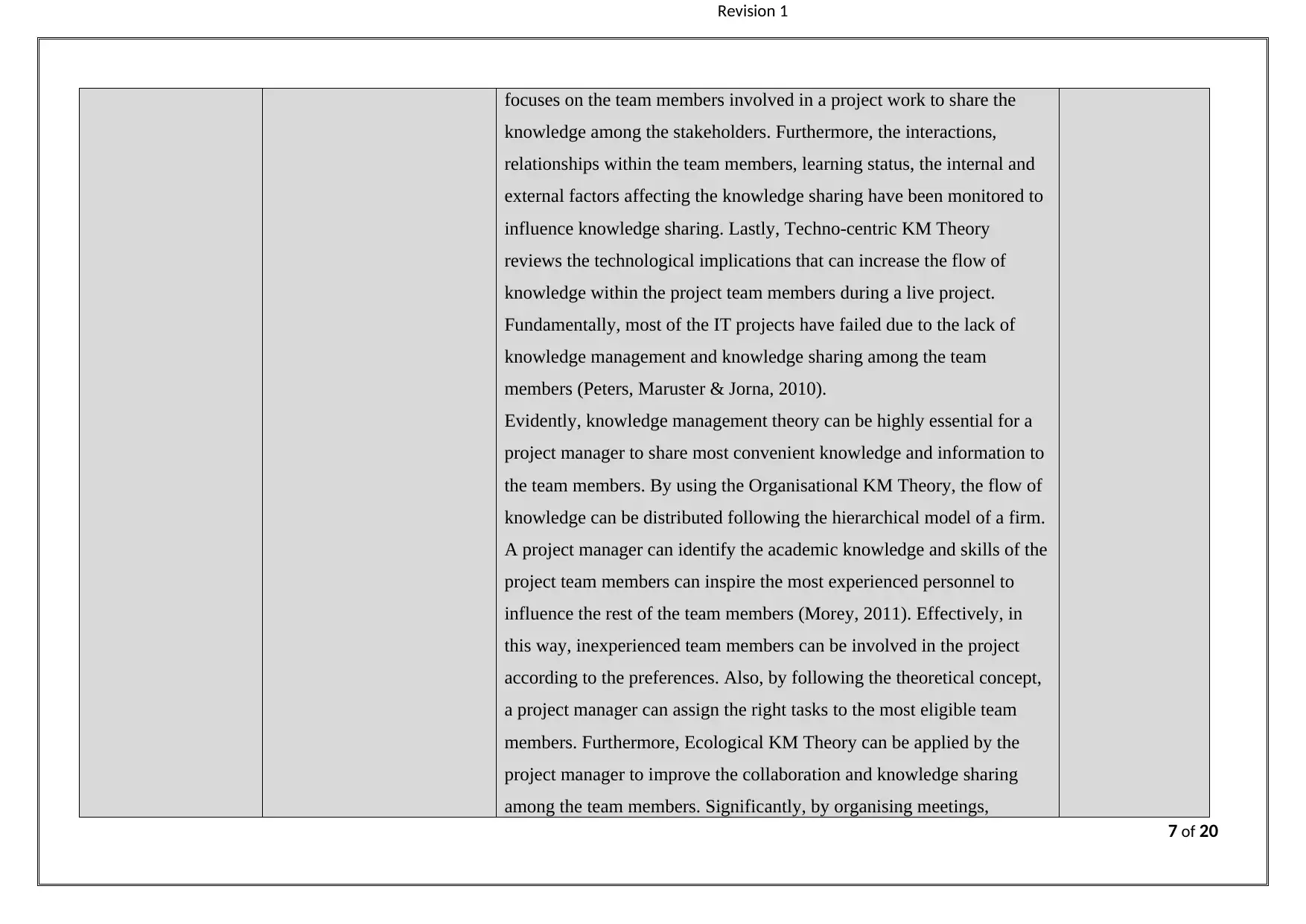
Revision 1
focuses on the team members involved in a project work to share the
knowledge among the stakeholders. Furthermore, the interactions,
relationships within the team members, learning status, the internal and
external factors affecting the knowledge sharing have been monitored to
influence knowledge sharing. Lastly, Techno-centric KM Theory
reviews the technological implications that can increase the flow of
knowledge within the project team members during a live project.
Fundamentally, most of the IT projects have failed due to the lack of
knowledge management and knowledge sharing among the team
members (Peters, Maruster & Jorna, 2010).
Evidently, knowledge management theory can be highly essential for a
project manager to share most convenient knowledge and information to
the team members. By using the Organisational KM Theory, the flow of
knowledge can be distributed following the hierarchical model of a firm.
A project manager can identify the academic knowledge and skills of the
project team members can inspire the most experienced personnel to
influence the rest of the team members (Morey, 2011). Effectively, in
this way, inexperienced team members can be involved in the project
according to the preferences. Also, by following the theoretical concept,
a project manager can assign the right tasks to the most eligible team
members. Furthermore, Ecological KM Theory can be applied by the
project manager to improve the collaboration and knowledge sharing
among the team members. Significantly, by organising meetings,
7 of 20
focuses on the team members involved in a project work to share the
knowledge among the stakeholders. Furthermore, the interactions,
relationships within the team members, learning status, the internal and
external factors affecting the knowledge sharing have been monitored to
influence knowledge sharing. Lastly, Techno-centric KM Theory
reviews the technological implications that can increase the flow of
knowledge within the project team members during a live project.
Fundamentally, most of the IT projects have failed due to the lack of
knowledge management and knowledge sharing among the team
members (Peters, Maruster & Jorna, 2010).
Evidently, knowledge management theory can be highly essential for a
project manager to share most convenient knowledge and information to
the team members. By using the Organisational KM Theory, the flow of
knowledge can be distributed following the hierarchical model of a firm.
A project manager can identify the academic knowledge and skills of the
project team members can inspire the most experienced personnel to
influence the rest of the team members (Morey, 2011). Effectively, in
this way, inexperienced team members can be involved in the project
according to the preferences. Also, by following the theoretical concept,
a project manager can assign the right tasks to the most eligible team
members. Furthermore, Ecological KM Theory can be applied by the
project manager to improve the collaboration and knowledge sharing
among the team members. Significantly, by organising meetings,
7 of 20
Paraphrase This Document
Need a fresh take? Get an instant paraphrase of this document with our AI Paraphraser
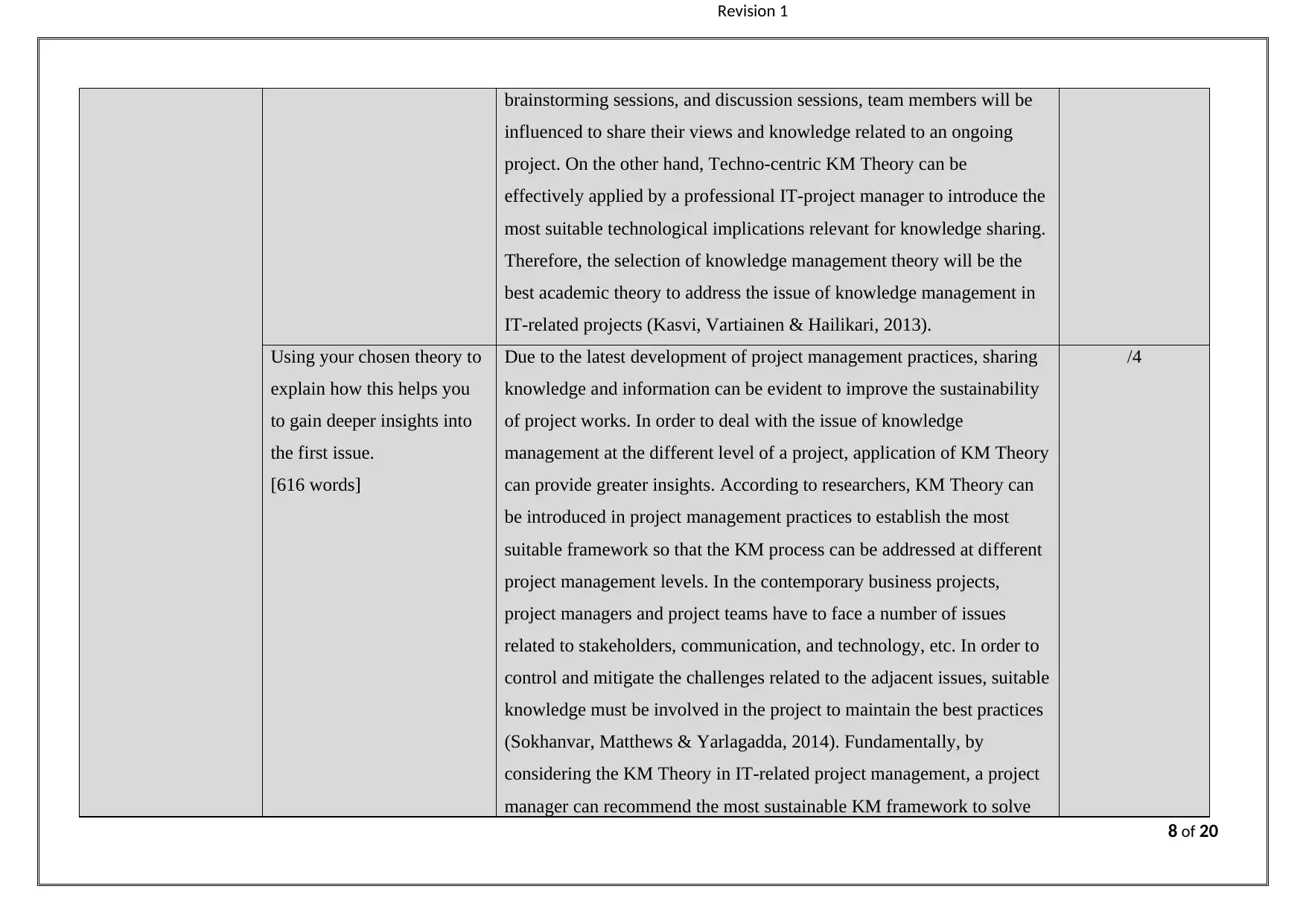
Revision 1
brainstorming sessions, and discussion sessions, team members will be
influenced to share their views and knowledge related to an ongoing
project. On the other hand, Techno-centric KM Theory can be
effectively applied by a professional IT-project manager to introduce the
most suitable technological implications relevant for knowledge sharing.
Therefore, the selection of knowledge management theory will be the
best academic theory to address the issue of knowledge management in
IT-related projects (Kasvi, Vartiainen & Hailikari, 2013).
Using your chosen theory to
explain how this helps you
to gain deeper insights into
the first issue.
[616 words]
Due to the latest development of project management practices, sharing
knowledge and information can be evident to improve the sustainability
of project works. In order to deal with the issue of knowledge
management at the different level of a project, application of KM Theory
can provide greater insights. According to researchers, KM Theory can
be introduced in project management practices to establish the most
suitable framework so that the KM process can be addressed at different
project management levels. In the contemporary business projects,
project managers and project teams have to face a number of issues
related to stakeholders, communication, and technology, etc. In order to
control and mitigate the challenges related to the adjacent issues, suitable
knowledge must be involved in the project to maintain the best practices
(Sokhanvar, Matthews & Yarlagadda, 2014). Fundamentally, by
considering the KM Theory in IT-related project management, a project
manager can recommend the most sustainable KM framework to solve
/4
8 of 20
brainstorming sessions, and discussion sessions, team members will be
influenced to share their views and knowledge related to an ongoing
project. On the other hand, Techno-centric KM Theory can be
effectively applied by a professional IT-project manager to introduce the
most suitable technological implications relevant for knowledge sharing.
Therefore, the selection of knowledge management theory will be the
best academic theory to address the issue of knowledge management in
IT-related projects (Kasvi, Vartiainen & Hailikari, 2013).
Using your chosen theory to
explain how this helps you
to gain deeper insights into
the first issue.
[616 words]
Due to the latest development of project management practices, sharing
knowledge and information can be evident to improve the sustainability
of project works. In order to deal with the issue of knowledge
management at the different level of a project, application of KM Theory
can provide greater insights. According to researchers, KM Theory can
be introduced in project management practices to establish the most
suitable framework so that the KM process can be addressed at different
project management levels. In the contemporary business projects,
project managers and project teams have to face a number of issues
related to stakeholders, communication, and technology, etc. In order to
control and mitigate the challenges related to the adjacent issues, suitable
knowledge must be involved in the project to maintain the best practices
(Sokhanvar, Matthews & Yarlagadda, 2014). Fundamentally, by
considering the KM Theory in IT-related project management, a project
manager can recommend the most sustainable KM framework to solve
/4
8 of 20
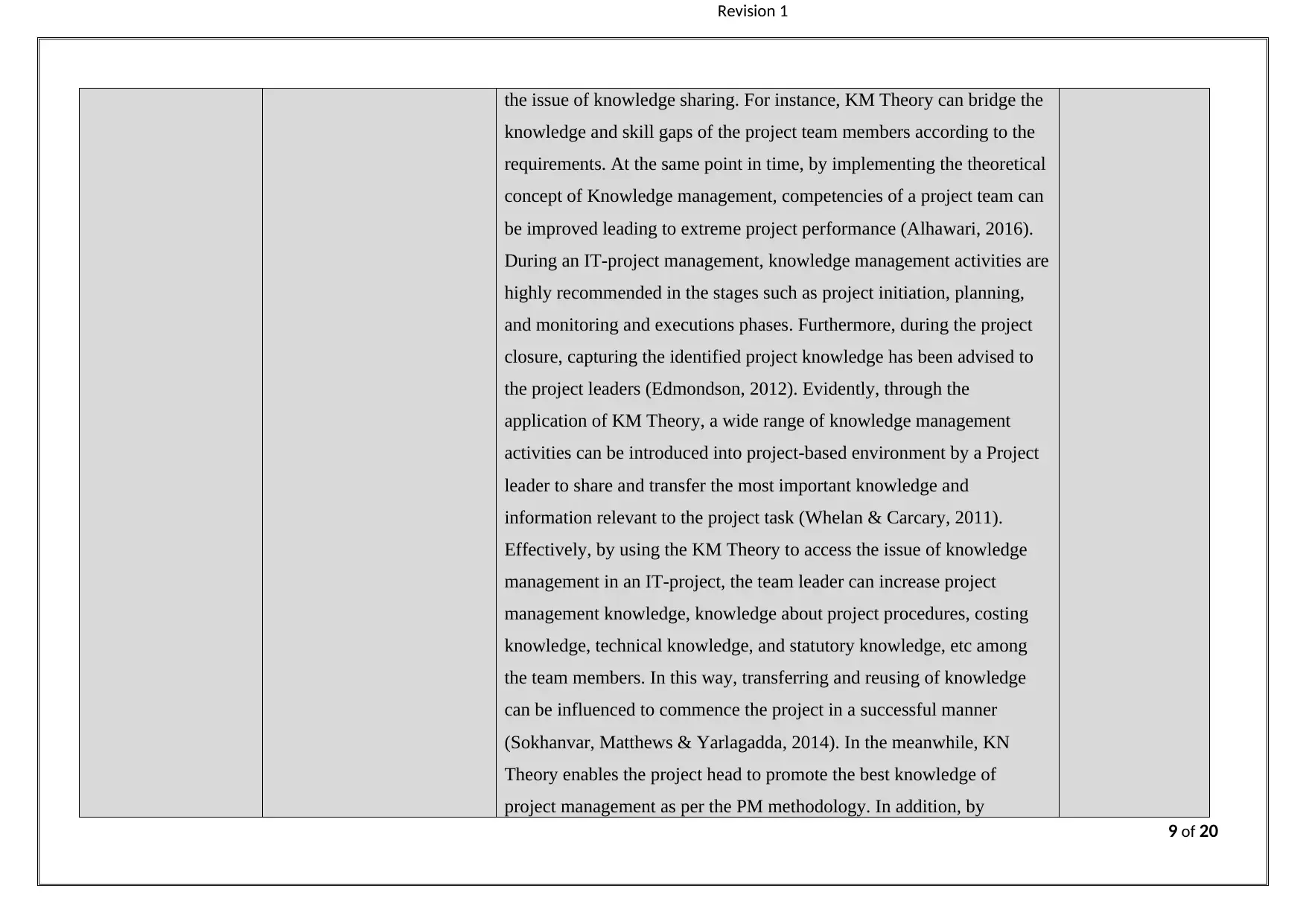
Revision 1
the issue of knowledge sharing. For instance, KM Theory can bridge the
knowledge and skill gaps of the project team members according to the
requirements. At the same point in time, by implementing the theoretical
concept of Knowledge management, competencies of a project team can
be improved leading to extreme project performance (Alhawari, 2016).
During an IT-project management, knowledge management activities are
highly recommended in the stages such as project initiation, planning,
and monitoring and executions phases. Furthermore, during the project
closure, capturing the identified project knowledge has been advised to
the project leaders (Edmondson, 2012). Evidently, through the
application of KM Theory, a wide range of knowledge management
activities can be introduced into project-based environment by a Project
leader to share and transfer the most important knowledge and
information relevant to the project task (Whelan & Carcary, 2011).
Effectively, by using the KM Theory to access the issue of knowledge
management in an IT-project, the team leader can increase project
management knowledge, knowledge about project procedures, costing
knowledge, technical knowledge, and statutory knowledge, etc among
the team members. In this way, transferring and reusing of knowledge
can be influenced to commence the project in a successful manner
(Sokhanvar, Matthews & Yarlagadda, 2014). In the meanwhile, KN
Theory enables the project head to promote the best knowledge of
project management as per the PM methodology. In addition, by
9 of 20
the issue of knowledge sharing. For instance, KM Theory can bridge the
knowledge and skill gaps of the project team members according to the
requirements. At the same point in time, by implementing the theoretical
concept of Knowledge management, competencies of a project team can
be improved leading to extreme project performance (Alhawari, 2016).
During an IT-project management, knowledge management activities are
highly recommended in the stages such as project initiation, planning,
and monitoring and executions phases. Furthermore, during the project
closure, capturing the identified project knowledge has been advised to
the project leaders (Edmondson, 2012). Evidently, through the
application of KM Theory, a wide range of knowledge management
activities can be introduced into project-based environment by a Project
leader to share and transfer the most important knowledge and
information relevant to the project task (Whelan & Carcary, 2011).
Effectively, by using the KM Theory to access the issue of knowledge
management in an IT-project, the team leader can increase project
management knowledge, knowledge about project procedures, costing
knowledge, technical knowledge, and statutory knowledge, etc among
the team members. In this way, transferring and reusing of knowledge
can be influenced to commence the project in a successful manner
(Sokhanvar, Matthews & Yarlagadda, 2014). In the meanwhile, KN
Theory enables the project head to promote the best knowledge of
project management as per the PM methodology. In addition, by
9 of 20
⊘ This is a preview!⊘
Do you want full access?
Subscribe today to unlock all pages.

Trusted by 1+ million students worldwide
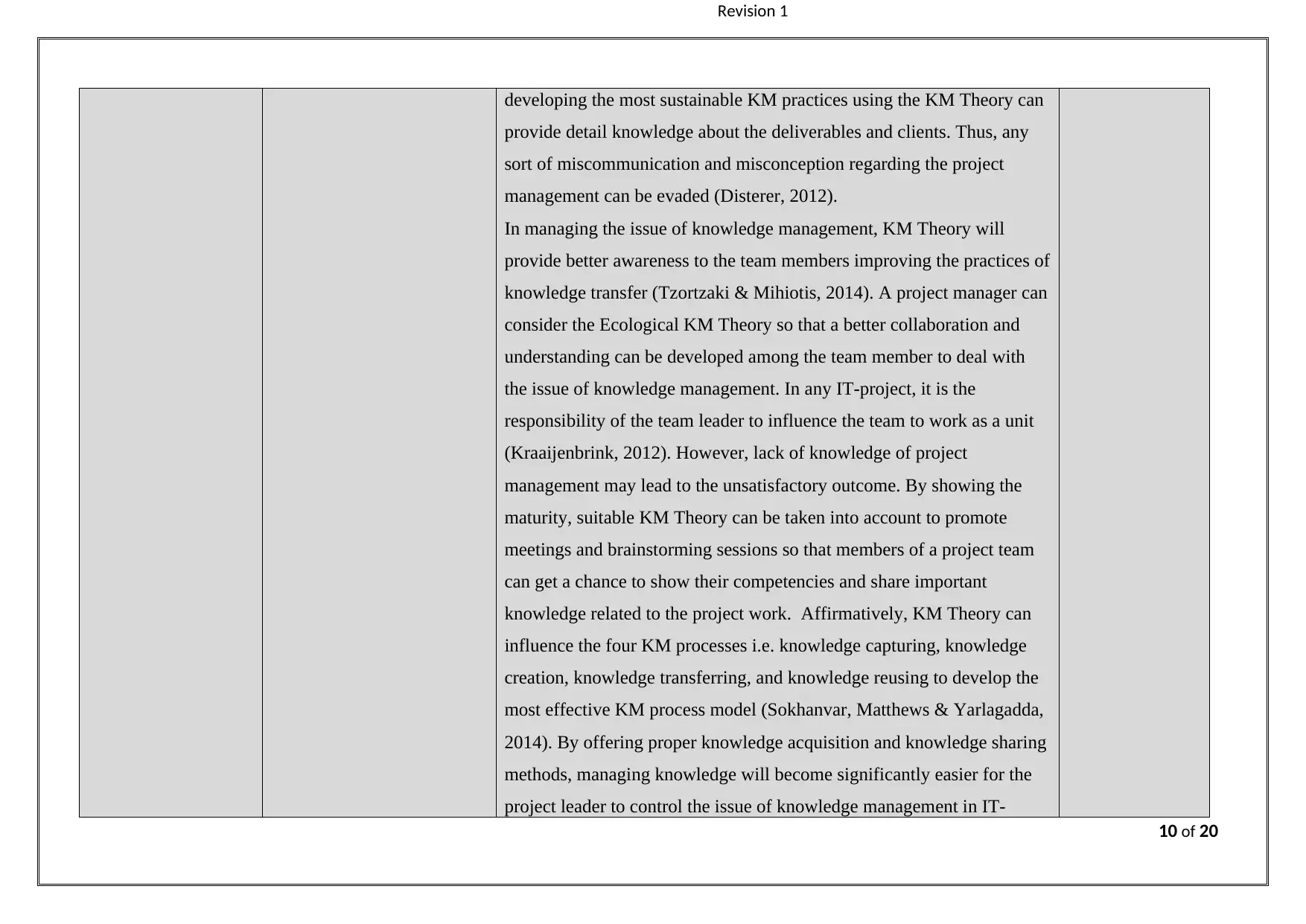
Revision 1
developing the most sustainable KM practices using the KM Theory can
provide detail knowledge about the deliverables and clients. Thus, any
sort of miscommunication and misconception regarding the project
management can be evaded (Disterer, 2012).
In managing the issue of knowledge management, KM Theory will
provide better awareness to the team members improving the practices of
knowledge transfer (Tzortzaki & Mihiotis, 2014). A project manager can
consider the Ecological KM Theory so that a better collaboration and
understanding can be developed among the team member to deal with
the issue of knowledge management. In any IT-project, it is the
responsibility of the team leader to influence the team to work as a unit
(Kraaijenbrink, 2012). However, lack of knowledge of project
management may lead to the unsatisfactory outcome. By showing the
maturity, suitable KM Theory can be taken into account to promote
meetings and brainstorming sessions so that members of a project team
can get a chance to show their competencies and share important
knowledge related to the project work. Affirmatively, KM Theory can
influence the four KM processes i.e. knowledge capturing, knowledge
creation, knowledge transferring, and knowledge reusing to develop the
most effective KM process model (Sokhanvar, Matthews & Yarlagadda,
2014). By offering proper knowledge acquisition and knowledge sharing
methods, managing knowledge will become significantly easier for the
project leader to control the issue of knowledge management in IT-
10 of 20
developing the most sustainable KM practices using the KM Theory can
provide detail knowledge about the deliverables and clients. Thus, any
sort of miscommunication and misconception regarding the project
management can be evaded (Disterer, 2012).
In managing the issue of knowledge management, KM Theory will
provide better awareness to the team members improving the practices of
knowledge transfer (Tzortzaki & Mihiotis, 2014). A project manager can
consider the Ecological KM Theory so that a better collaboration and
understanding can be developed among the team member to deal with
the issue of knowledge management. In any IT-project, it is the
responsibility of the team leader to influence the team to work as a unit
(Kraaijenbrink, 2012). However, lack of knowledge of project
management may lead to the unsatisfactory outcome. By showing the
maturity, suitable KM Theory can be taken into account to promote
meetings and brainstorming sessions so that members of a project team
can get a chance to show their competencies and share important
knowledge related to the project work. Affirmatively, KM Theory can
influence the four KM processes i.e. knowledge capturing, knowledge
creation, knowledge transferring, and knowledge reusing to develop the
most effective KM process model (Sokhanvar, Matthews & Yarlagadda,
2014). By offering proper knowledge acquisition and knowledge sharing
methods, managing knowledge will become significantly easier for the
project leader to control the issue of knowledge management in IT-
10 of 20
Paraphrase This Document
Need a fresh take? Get an instant paraphrase of this document with our AI Paraphraser
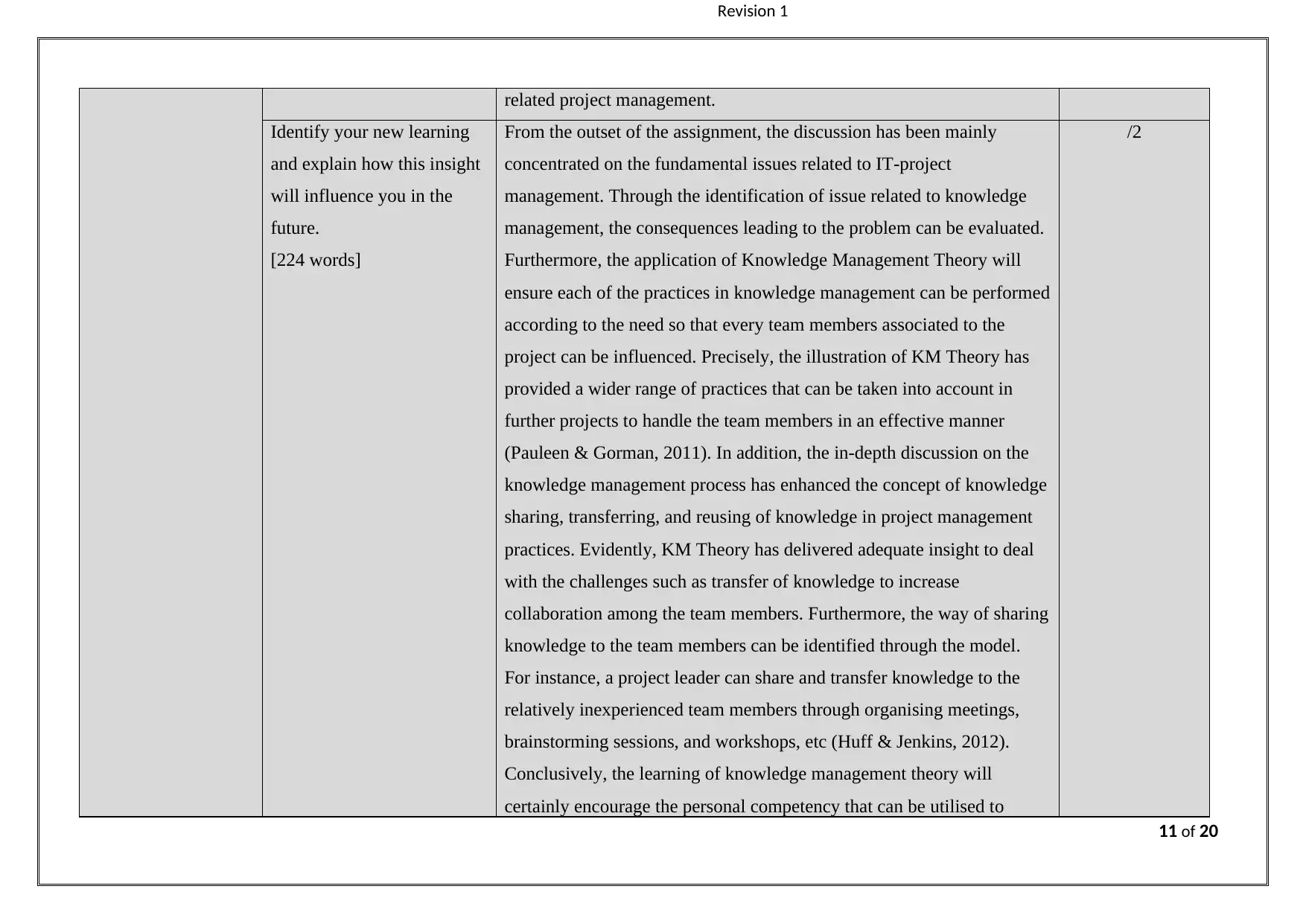
Revision 1
related project management.
Identify your new learning
and explain how this insight
will influence you in the
future.
[224 words]
From the outset of the assignment, the discussion has been mainly
concentrated on the fundamental issues related to IT-project
management. Through the identification of issue related to knowledge
management, the consequences leading to the problem can be evaluated.
Furthermore, the application of Knowledge Management Theory will
ensure each of the practices in knowledge management can be performed
according to the need so that every team members associated to the
project can be influenced. Precisely, the illustration of KM Theory has
provided a wider range of practices that can be taken into account in
further projects to handle the team members in an effective manner
(Pauleen & Gorman, 2011). In addition, the in-depth discussion on the
knowledge management process has enhanced the concept of knowledge
sharing, transferring, and reusing of knowledge in project management
practices. Evidently, KM Theory has delivered adequate insight to deal
with the challenges such as transfer of knowledge to increase
collaboration among the team members. Furthermore, the way of sharing
knowledge to the team members can be identified through the model.
For instance, a project leader can share and transfer knowledge to the
relatively inexperienced team members through organising meetings,
brainstorming sessions, and workshops, etc (Huff & Jenkins, 2012).
Conclusively, the learning of knowledge management theory will
certainly encourage the personal competency that can be utilised to
/2
11 of 20
related project management.
Identify your new learning
and explain how this insight
will influence you in the
future.
[224 words]
From the outset of the assignment, the discussion has been mainly
concentrated on the fundamental issues related to IT-project
management. Through the identification of issue related to knowledge
management, the consequences leading to the problem can be evaluated.
Furthermore, the application of Knowledge Management Theory will
ensure each of the practices in knowledge management can be performed
according to the need so that every team members associated to the
project can be influenced. Precisely, the illustration of KM Theory has
provided a wider range of practices that can be taken into account in
further projects to handle the team members in an effective manner
(Pauleen & Gorman, 2011). In addition, the in-depth discussion on the
knowledge management process has enhanced the concept of knowledge
sharing, transferring, and reusing of knowledge in project management
practices. Evidently, KM Theory has delivered adequate insight to deal
with the challenges such as transfer of knowledge to increase
collaboration among the team members. Furthermore, the way of sharing
knowledge to the team members can be identified through the model.
For instance, a project leader can share and transfer knowledge to the
relatively inexperienced team members through organising meetings,
brainstorming sessions, and workshops, etc (Huff & Jenkins, 2012).
Conclusively, the learning of knowledge management theory will
certainly encourage the personal competency that can be utilised to
/2
11 of 20

Revision 1
handle future project works.
For the second issue,
identify at least one
academic theory to deepen
your insights into the issue
Briefly introduce [and
reference] your chosen
academic theory.
Justify your choice.
[420 words]
The influences of institutional complexity have emerged to be a primary
challenge for project management in innovative project. According to
Prof. Sue Newell, the issues of differences in the thought of the people
and the variances in their demand become difficult for the project
management team to consider while developing an innovative project.
The variances in the mindset of the people and resistance from the
stakeholders are primary challenges for the project management team.
Additionally, the change in the expectation of the stakeholders and their
behaviour of influencing the project management decision creates
different types of complexity for the project management team (Yung
2014). Hence, it is important for the members of project management
teams to identify the organisational complexities that main influence the
progress and completion of the project.
On the basis of the issue discussed above, two academic theories have
been discussed in this section to draw a deeper insight into the second
issue. The first one is the Institutional complexity theory and the second
one is the Paradox theory (Waldman et al. 2016). Both the theories deal
with the human behaviour of competing demands that leads to
institutional complexities and conflicts among the members of a firm
(Yung 2014). Firstly, the institutional theory presents the competing
demands emerging from different field level stresses and pressures due
to the oppositional and contradictory nature of the users or project
/3
12 of 20
handle future project works.
For the second issue,
identify at least one
academic theory to deepen
your insights into the issue
Briefly introduce [and
reference] your chosen
academic theory.
Justify your choice.
[420 words]
The influences of institutional complexity have emerged to be a primary
challenge for project management in innovative project. According to
Prof. Sue Newell, the issues of differences in the thought of the people
and the variances in their demand become difficult for the project
management team to consider while developing an innovative project.
The variances in the mindset of the people and resistance from the
stakeholders are primary challenges for the project management team.
Additionally, the change in the expectation of the stakeholders and their
behaviour of influencing the project management decision creates
different types of complexity for the project management team (Yung
2014). Hence, it is important for the members of project management
teams to identify the organisational complexities that main influence the
progress and completion of the project.
On the basis of the issue discussed above, two academic theories have
been discussed in this section to draw a deeper insight into the second
issue. The first one is the Institutional complexity theory and the second
one is the Paradox theory (Waldman et al. 2016). Both the theories deal
with the human behaviour of competing demands that leads to
institutional complexities and conflicts among the members of a firm
(Yung 2014). Firstly, the institutional theory presents the competing
demands emerging from different field level stresses and pressures due
to the oppositional and contradictory nature of the users or project
/3
12 of 20
⊘ This is a preview!⊘
Do you want full access?
Subscribe today to unlock all pages.

Trusted by 1+ million students worldwide
1 out of 20
Your All-in-One AI-Powered Toolkit for Academic Success.
+13062052269
info@desklib.com
Available 24*7 on WhatsApp / Email
![[object Object]](/_next/static/media/star-bottom.7253800d.svg)
Unlock your academic potential
Copyright © 2020–2026 A2Z Services. All Rights Reserved. Developed and managed by ZUCOL.